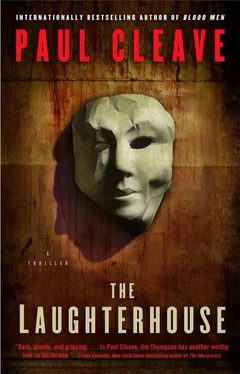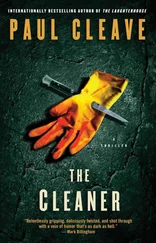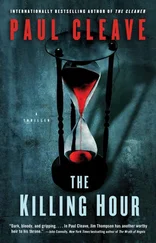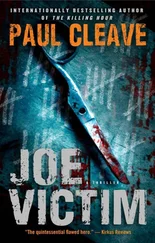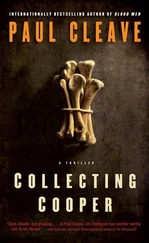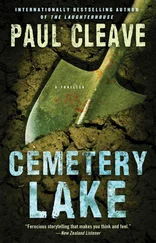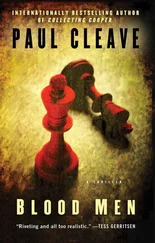Paul Cleave - The Laughterhouse
Здесь есть возможность читать онлайн «Paul Cleave - The Laughterhouse» весь текст электронной книги совершенно бесплатно (целиком полную версию без сокращений). В некоторых случаях можно слушать аудио, скачать через торрент в формате fb2 и присутствует краткое содержание. Год выпуска: 2012, ISBN: 2012, Издательство: Atria Books, Жанр: Триллер, на английском языке. Описание произведения, (предисловие) а так же отзывы посетителей доступны на портале библиотеки ЛибКат.
- Название:The Laughterhouse
- Автор:
- Издательство:Atria Books
- Жанр:
- Год:2012
- ISBN:9781451677959
- Рейтинг книги:5 / 5. Голосов: 1
-
Избранное:Добавить в избранное
- Отзывы:
-
Ваша оценка:
- 100
- 1
- 2
- 3
- 4
- 5
The Laughterhouse: краткое содержание, описание и аннотация
Предлагаем к чтению аннотацию, описание, краткое содержание или предисловие (зависит от того, что написал сам автор книги «The Laughterhouse»). Если вы не нашли необходимую информацию о книге — напишите в комментариях, мы постараемся отыскать её.
The Laughterhouse — читать онлайн бесплатно полную книгу (весь текст) целиком
Ниже представлен текст книги, разбитый по страницам. Система сохранения места последней прочитанной страницы, позволяет с удобством читать онлайн бесплатно книгу «The Laughterhouse», без необходимости каждый раз заново искать на чём Вы остановились. Поставьте закладку, и сможете в любой момент перейти на страницу, на которой закончили чтение.
Интервал:
Закладка:
The rain has eased off and umbrellas are shaken and folded back down, but the sky is starting to darken. A few people leave and the trend catches on. I get back to the car and there’s a leaflet hooked beneath the windshield wiper. An ad for a brothel in town, “Bring the voucher and entry is half price.” Traffic becomes congested as we all try to move out. The funeral procession leads us into town where we all start splitting up looking for parking spots, most of us taking a nearby parking structure. Tires squeal on the ramps, and there are plenty of paint marks on the walls from cars that have taken the turns too narrowly over the years. I park near the top and take the stairs down. At the bottom is a homeless guy who tries selling me Jesus for the price of beer.
Popular Consensus is a nightclub near The Strip, a line of bars operating as cafés and restaurants during the day, then doubling as nightclubs after nine. The club is owned by Landry’s brother, and is about five hours away from doing peak business with the thousands of alcoholic teenagers who roam this city at night. But right now the doors are open for those of us who knew Landry and the tables are full of sausage rolls and sandwiches and it’s an open bar. Nearly every flat surface has a photograph of Landry on it, and I study one from our days at the academy; him and Schroder and me side by side, hairlines further forward and Landry and Schroder’s stomachs not as round as they are now, and I guess those are things Landry doesn’t have to worry about anymore. The club has all the lights on and everybody sits around the bar and at the booths sharing stories and tears.
“Here,” Schroder says, handing me a drink.
“I’m fine,” I tell him.
“It’s only orange juice,” he says, and I take it from him. I look longingly at his beer as he nurses it, remembering how beer and all of its friends got me into trouble last year. “Seems like a lifetime ago,” he says, nodding toward the picture.
“I don’t even remember half these people,” I tell him.
“Landry’s the first.”
“Huh?”
He nods toward the picture again. “First one in that photo to have gotten himself killed.”
We sip at our drinks and take a few seconds to contemplate what he just said, wondering if he’ll be the last, wondering if the others will end up retiring in a few years or quitting now. A stereo is turned on, The Rolling Stones start playing to the bar, Landry’s favorite band-one of my favorites too.
“What the hell was he doing working on his own?” I ask.
He shrugs before coming up with something I wasn’t expecting. “ME says he had cancer.”
“What?”
“He’d have been dead before the year was out. I think he just got sick of the way things play out in this city.” He tips up his beer and drains half of it down his throat. “He tried to make a difference by himself and got killed for it.”
We move back to the bar. Every detective is trying to drink enough to hibernate through the winter. Landry’s brother looks more upset at the tab he’s covering than at his brother getting killed. He looks like he’s wishing he’d watered down the whiskey more than he already has. Schroder gets another beer and finishes it before I’m even a third of the way through my juice. All the voices are getting louder and there are snippets of stories coming from every direction, less and less of them about Landry the more everybody drinks, more and more of them about Christchurch, about the weather and the crime rate and the boy-racers, the boy-racers who have their teeth in this city and won’t let go. They block the streets at night racing their brightly colored cars, cars lowered and modified to look cool and be loud. The conversations get darker as the first hour slips into the second, the words more slurred, theories being thrown about on how to make this city a better place, who we ought to be going around shooting to make that happen. Schroder finishes off his third beer and I start on my second juice. Other cops come over to talk to us, there’s lots of “you guys were at the academy with him, right?” and “you should come back to the force, Tate,” and “last thing the force needs is you coming back.” I sip at my drink, wanting nothing more than to get the hell out of here, wondering how many of these people will resent me if I do make it back onto the team.
“How are things going with the Melissa X case?” I ask Schroder.
He starts on a new beer, sipping at it slowly for a few seconds before lowering it back to the bar. “It’s like we’re chasing a ghost,” he says.
Melissa X is the woman the Christchurch Carver, a notorious serial killer now in jail, partnered up with. She is still on the loose-and still killing. When I was released from jail in February, Schroder was there to meet me in the parking lot, the Melissa X file in his car and needing all the help he could get. We found out her true identity. Her real name is Natalie Flowers-but she started calling herself Melissa when she was attacked and raped three years ago by her college professor. Since then she has tortured and killed at least half a dozen men, the last of which was seven weeks ago.
“Nothing new?”
“We’ve spoken to all her friends, all her family. Nothing,” he says. “We’ve followed up with surgeons and health clinics, checking to see if she’s had any cosmetic surgery, but nothing. It’s like she’s left this planet, and just when you think that might be true, she’ll kill somebody else.”
“It does seem that way,” I say. I have the file too, and I keep looking at it every day just like Schroder, but for me looking at that file isn’t paying the bills.
“We’ll get her,” he says. “I can promise you that.”
The woman I sat next to at the funeral sees us and comes over. Schroder stands up and smiles at her and I do the same.
“Theodore Tate, this is Detective Inspector Kent,” he says, introducing us.
“Call me Rebecca,” she says, shaking my hand.
Rebecca is a few inches shorter than me, a few pounds lighter, and probably with a few less problems in the world. Athletic and attractive. Both Schroder and myself can’t stop smiling at her. She has black hair that hangs to her shoulders that she brushes back behind her shoulder.
“You work with Schroder?” I ask.
“Detective Kent just transferred down here from Auckland,” he says. “She’s only been with us a week. She was one of their best so we’re lucky to have her.”
She smiles. “I’m lucky to be back,” she says. “I’m Christchurch born and raised.”
“Really,” I say. “When did you leave?”
“Right after the police academy,” she says. “I got posted in Auckland ten years ago and have been trying to get back since.”
“That reminds me,” Schroder says, turning toward me. “Emma Green has been accepted into the academy.”
“I knew she was applying,” I say.
“Emma Green. How do I know that name?” Rebecca asks.
“She’s the girl who was abducted earlier this year,” he says. “Tate found her.”
“Oh, of course,” she says. “The same girl you. .” she says, but doesn’t finish.
Emma Green is the same girl I ran into with my car last year when I was drunk. It’s what landed me in prison.
“I’m sorry,” she says. “That was dumb of me. I’ve had three too many gin and tonics,” she says, rattling the ice in the bottom of her empty glass.
“Not your fault. I’m the one who was being dumb last year,” I tell her, unsure of how I feel about Emma joining the force.
“Well, it’s all in the past now,” Schroder says.
He takes another sip of beer, then the conversation changes. Rebecca gets another gin and tonic and comes back. We start talking about Schroder’s family. He pulls out his wallet and shows me photographs of his daughter and his six-month-old son. I’ve never seen his son before; met his daughter plenty of times but haven’t seen her in a few years. Rebecca smiles at the photographs and tells Schroder how cute his children are, before saying she doesn’t have children but she does have two cats and laughs that she understands how much work it must be for him.
Читать дальшеИнтервал:
Закладка:
Похожие книги на «The Laughterhouse»
Представляем Вашему вниманию похожие книги на «The Laughterhouse» списком для выбора. Мы отобрали схожую по названию и смыслу литературу в надежде предоставить читателям больше вариантов отыскать новые, интересные, ещё непрочитанные произведения.
Обсуждение, отзывы о книге «The Laughterhouse» и просто собственные мнения читателей. Оставьте ваши комментарии, напишите, что Вы думаете о произведении, его смысле или главных героях. Укажите что конкретно понравилось, а что нет, и почему Вы так считаете.
